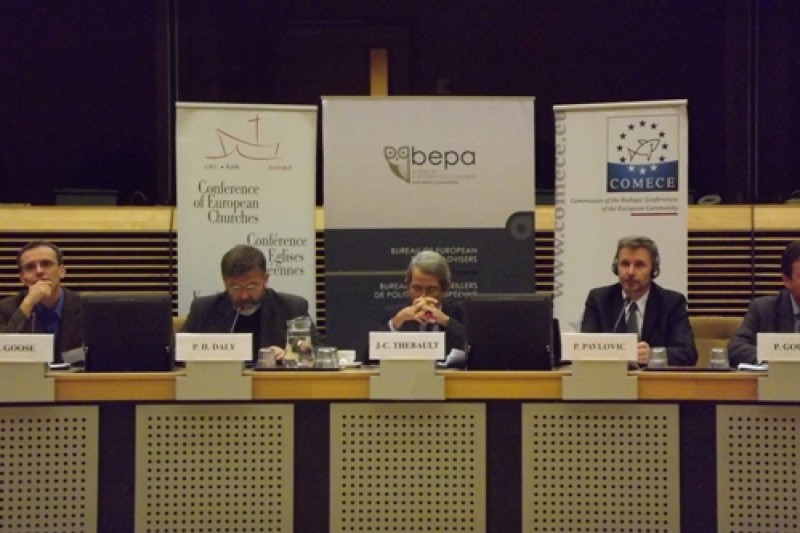Press Release No: 13/26
21 October 2013
Jointly issued with the Commission of Bishops' Conferences in the European Community (COMECE)
In light of the IPCC’s 5th Assessment report, and in advance of the Warsaw Climate Change Conference, a one day seminar entitled “Environmental protection and climate change as a challenge for policies – the role of ethics, lifestyles, solidarity and global justice” has concluded. Organised jointly by the Church and Society Commission of the Conference of European Churches (CEC) and the Commission of the Episcopates of the European Community (COMECE), in collaboration with the Bureau of European Policy Advisors (BEPA), this ‘dialogue seminar’ involved expert contributors—confessional and non-confessional—participating in an open forum.
Considering the scientific evidence presented in the IPCC’s latest report, Prof. Goose from the Catholic University of Leuven highlighted the irrefutability of the anthropic factor in causing climate change. This indisputability was the foundation for the day’s discussion, with the disparity between simply knowing/acknowledging this fact and acting on this fact being repeatedly addressed.
As climate change is global, it is also an issue that faith-based development organisations tackle. As Janna Schönfeld of APRODEV (an association of 17 major development and humanitarian aid organisations in Europe,) affirmed: “The EU is the second biggest historical emitter of CO2 after the US. At the same time, it is one of the richest regions of the world. The EU clearly has a moral responsibility to act.” This sentiment was echoed by Bernd Nilles of CIDSE (an international alliance of 16 Catholic development agencies from Europe and North America), who stated that “Continued exploitation of fossil fuel, growth based economies and a lack of commitment to finance mitigation and adaptation put vulnerable communities at risk.” Mgr. Gomes, Auxiliary Bishop of the Archdiocese of Dhaka, Bangladesh, in his video-message reaffirmed that “it is the poor who suffer because of climate injustice and climate change. We must take away from that suffering, rather than add to it.” Whilst the resources exist to feed, clothe and house everyone these benefits are not distributed equally —a fact which is exacerbated by geo-political borders. Solutions of challenges we are facing proposed by developed countries are by now far from satisfactory. Prof. Dr. Hans Diefenbacher of the University of Heidelberg highlighted the gap between the illusion of short-term economic benefits and long-term sustainable measures needed for curing continual climate degradation in a fair and equitable manner.
Martin Scheele, from the European Commission, DG Agriculture and Rural Development, emphasised the importance of increasing resource efficiency and addressing not only the chain of production, but also consumer behaviour (consumer awareness and the issue of ‘choice’). Acknowledging one’s own responsibility, embracing the paradigm shift towards the ‘notion of enough’ and undertaking a lifestyle change is at the crux of addressing the anthropic factor. The role of the Church in achieving this was underscored and reiterated. If the Church is to realise its potential as a driving force in changing patterns of consumption, it must first get its own house in order. Even if examples of best practice demonstrate that the Church is already proactive in this respect.
Finally, the call for bold, ambitious and binding targets, up to 2050 and beyond was acknowledged by Dr. Runge-Metzger Chief Climate Negotiator and Director for the International Climate Strategy at the EC's Climate Department who said that whatever the financial cost of increasing targets on Climate Action, it was a small price to pay for future citizens —those born and those not-yet-born.
Concluding the seminar, the representatives of Churches expressed their readiness to make a substantial contribution towards mitigating the effects of climate change, from the COP (Conference of the Parties) in November 2013 in Warsaw to Peru (2014), Paris (2015) and beyond.
Whilst considering technical solutions, it is however of critical importance that the spiritual aspect of stewardship is not neglected. Both Fr. Jose Ignacio Garcia SJ (JESC) and Rev. Henrik Grape of the Church of Sweden emphasised the spiritual dimension of being good stewards of creation. Fr. Garcia spoke of legitimate fear for the future but reminded participants that fear can lead to paralysis. He reflected that “fear can be cast out by love, by sincere love” and as Rev. Grape stated, “love for our planet, the creation that we are living in and we are dependent upon, forces us to act.”
***************
The Conference of European Churches (CEC) is a fellowship of some 115 Orthodox, Protestant, Anglican and Old Catholic Churches from all countries of Europe, plus 40 associated organisations. CEC was founded in 1959. It has offices in Geneva, Brussels and Strasbourg.
The Church and Society Commission of CEC provides a platform for the CEC membership to reflect on socio-ethical issues ecumenically and to involve them in common action and advocacy in relation to the European Union, the Council of Europe, the North Atlantic Treaty Organisation, the Organisation for Security and Co-operation in Europe and the United Nations (in European matters). CSC operates as a forum for action, dialogue and ecumenical training in European affairs.
For more information please contact:
Mag. Elizabeta Kitanovic
Church and Society Commission of CEC
Rue Joseph II, 174
B-1000 Bruxelles
Tel. +32 2 230 17 32
Fax +32 2 231 14 13
E-Mail: eki@cec-kek.be
